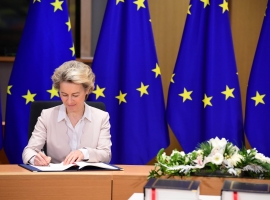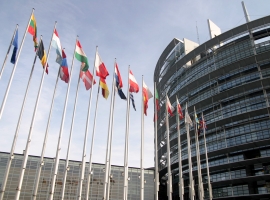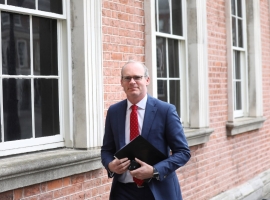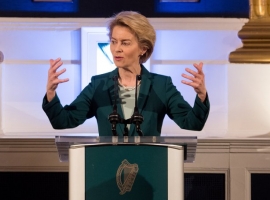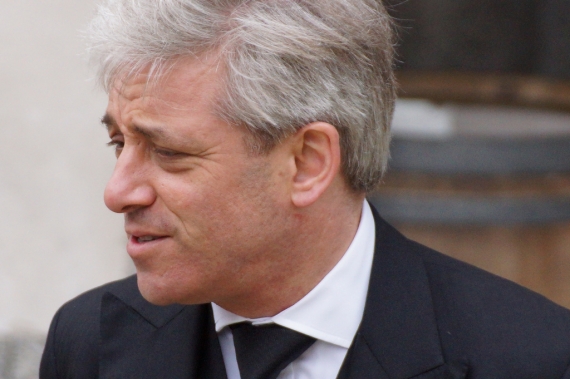
Prime Minister Theresa May's Brexit plans were in disarray on Tuesday as her government sought to plot a way around a ruling by the speaker of parliament that she must change her twice-defeated divorce deal to put it to a third vote.
After two-and-a-half years of negotiations, Britain's departure from the European Union remains uncertain with options including a long postponement, leaving with May's deal, a disruptive exit without a deal, or even another referendum.
In a move that added to the sense of crisis in London and exasperation in European capitals just days before the March 29 exit date, Speaker John Bercow shocked May's government by ruling it could not put the same Brexit deal to another vote unless it was substantially different.
Brexit Secretary Steve Barclay said the ruling meant a vote this week on May's deal was more unlikely but ministers were studying ways out of the impasse and he indicated the government still planned a third vote on May's deal.
"This is a moment of crisis for our country," Barclay said. "The ruling from the speaker has raised the bar and I think that makes it more unlikely the vote will be this week."
May is due at an EU summit in Brussels on Thursday at which she will ask for a delay to Brexit as the British government tries to come up with a way to leave the European Union after 46 years of membership.
The bloc's two most powerful members, Germany and France, expressed intense frustration at the chaos in London.
"Dear friends in London, please deliver. The clock is ticking," Germany's Europe minister, Michael Roth, told reporters in Brussels.
France was blunter, and warned a no-deal exit was possible.
"Grant an extension - what for? Time is not a solution, it's a method," France's EU affairs minister, Nathalie Loiseau, said. "If there is an objective and a strategy, it has to come from London."
The 2016 referendum, in which 17.4 million voters backed leaving and 16.1 million backed staying, showed a deeply divided country and has fuelled soul-searching about everything from secession and immigration to capitalism and modern Britishness.
The crisis has left allies and investors puzzled by a country that was for decades touted as a confident pillar of Western economic and political stability.
Bercow said his ruling, based on a convention dating back to 1604, should not be considered his last word and the government could bring forward a new proposition that was not the same as those already voted upon.
Because May must now spice any deal with additional legal and procedural innovation, Bercow's ruling means she is likely to get just one more chance to put the deal to a vote.
Brexit Secretary Barclay, who last week said Britain should not fear a no-deal exit, indicated the government was looking at different options and that circumstances, such an extension or a shift in support, would indicate a change in context.
"The speaker himself has pointed to possible solutions, he himself has said in earlier rulings we should not be bound by precedent," Barclay said. "You can have the same motion but where the circumstances have changed."
"The speaker himself has said that where the will of the House is for a certain course of action, then it is important that the will of the House is respected."
Even before Bercow's intervention, May was scrambling to rally support for her deal - which keeps close trading ties with the EU while leaving the bloc's formal structures - after it was defeated by a massive 230 votes in parliament on Jan. 15, and by 149 votes on March 12.
To get her deal through parliament, May must win over at least 75 lawmakers - dozens of rebels in her own Conservative Party, some Labour lawmakers, and the Northern Irish Democratic Unionist Party (DUP), which props up her minority government.
The biggest issue is the so-called Northern Irish border backstop, an insurance policy aimed at avoiding post-Brexit controls on the United Kingdom's border with EU-member Ireland.
Many Brexiteers and the DUP are concerned the backstop will trap the United Kingdom in the EU's orbit indefinitely, and have sought guarantees it will not.
The Financial Times said May had been told by senior colleagues she will have to set a timetable for her own departure if she is to persuading many rebels to support her deal.
Barclay ruled out May asking Queen Elizabeth to cut short the entire parliamentary session, known as prorogation, saying involving the 92-year-old monarch in Brexit was a bad idea.(Reuters)
Source: www.businessworld.ie


